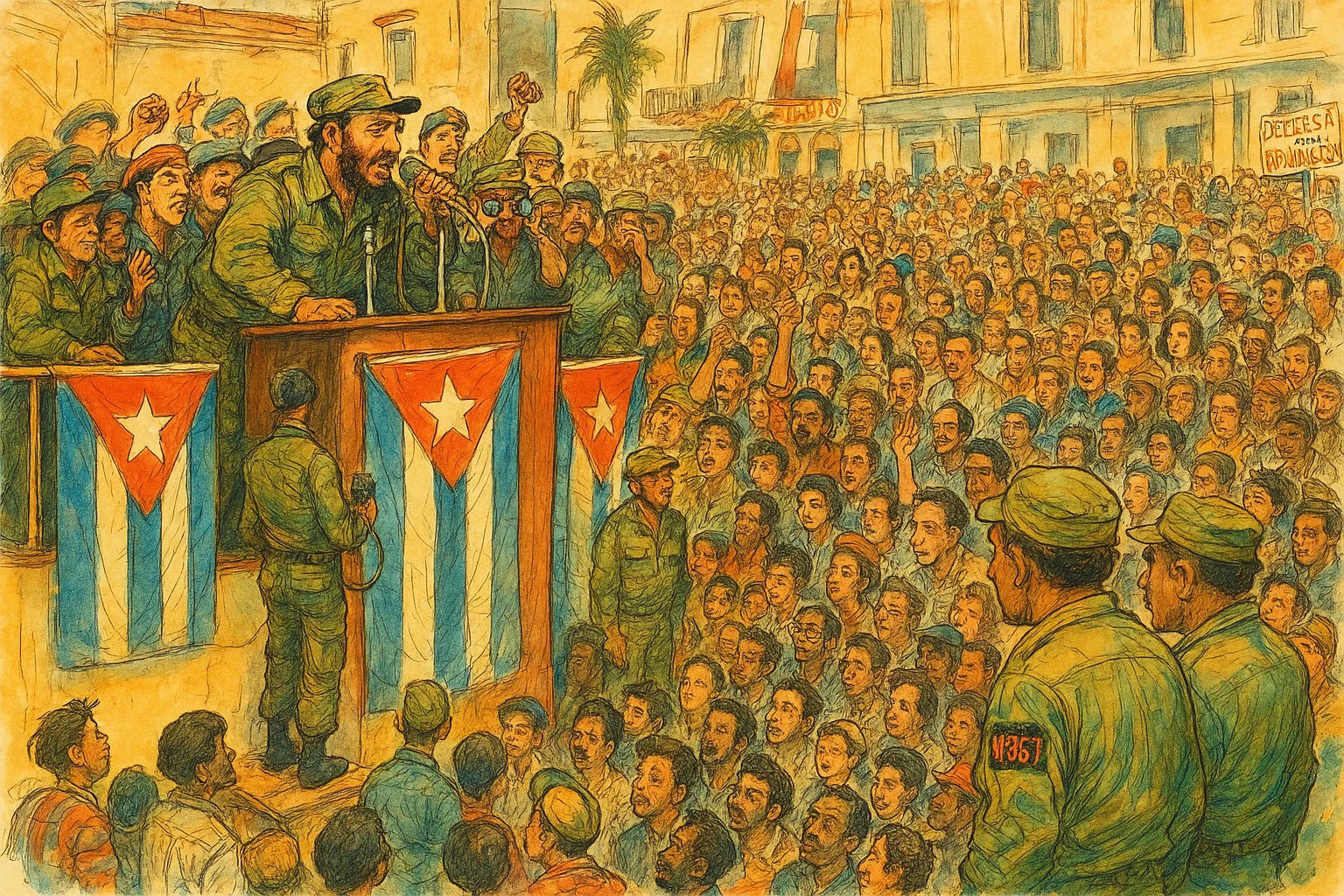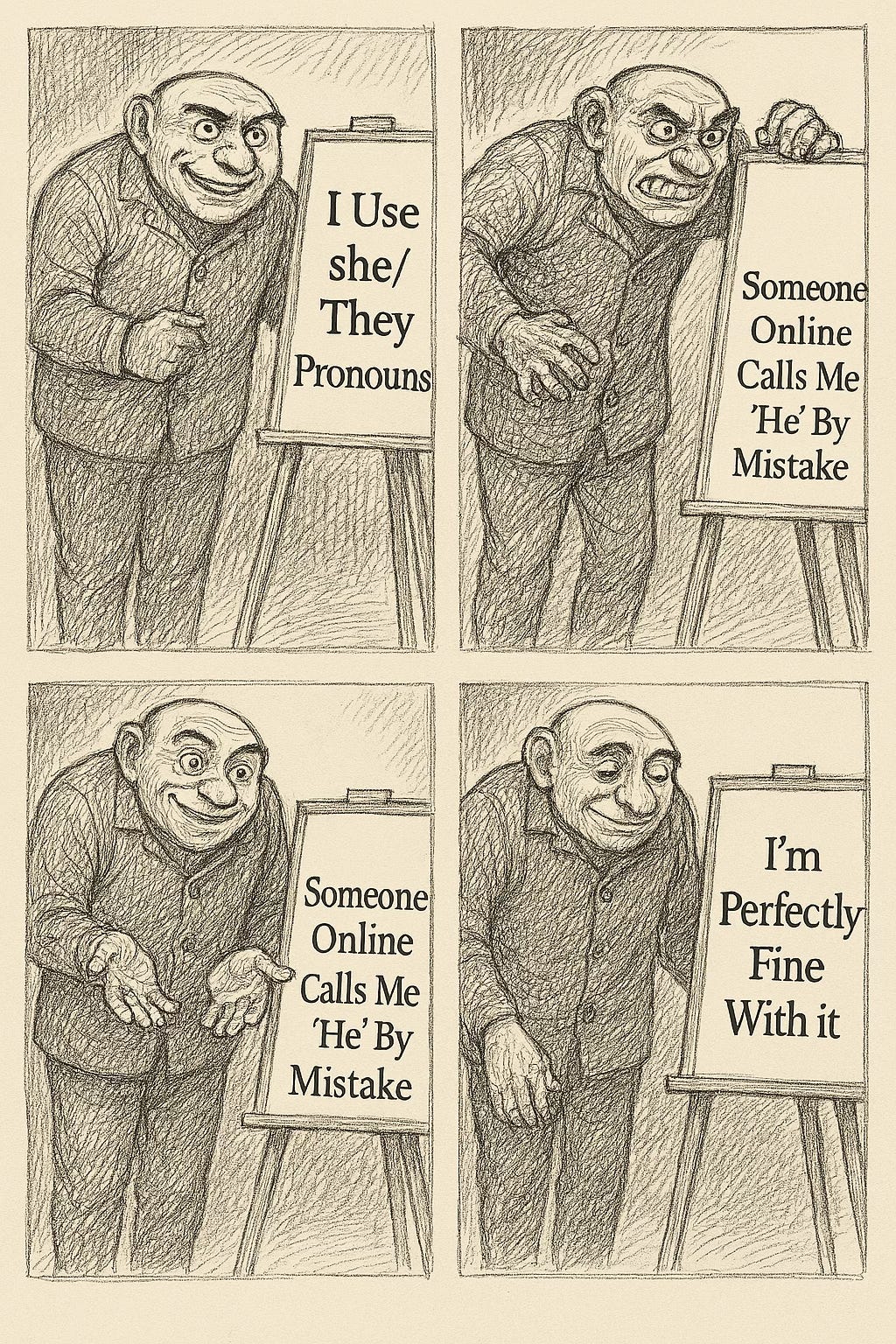Whenever We Force Equal Outcomes, We Forfeit Both Equality and Outcomes
What History Teaches About Equality by Decree
I’ve never met anyone who wants every human life to be a clone—same spouse, same house, same height, same hobbies. Yet many label a system “unfair” if it fails to grant identical outcomes. They argue that equal access to jobs or contests isn’t enough; each person, they insist, must end equally rewarded, satisfied, and recognized. “If one person works hard and succeeds,” they say, “anyone else who works hard should receive the same payoff.”
Here lies the paradox: stopping anyone from pulling ahead demands slowing down the faster or propping up the slower. In practice, a government or an activist group decides what is “fair,” then enforces it by force, shame, or policy. Ironically, “making everyone a winner” creates a new power structure, letting those who level the field decide who gets how much. History reveals how forced outcomes spawn fresh inequalities, anger, and oppression—from the Soviet Union and Cambodia’s Khmer Rouge to Chavez’s Venezuela, East Germany, Perón’s Argentina, certain Buddhist movements in Myanmar, Anti-Gender or Pro-Gender campaigns, Cancel Culture, and Woke Culture.
Again and again, outcome-based equality has failed to yield fairness, whether defined as equality of opportunity or equality of outcome. Outcome-based equality often erodes freedom, well-being, and prosperity. By contrast, equality of opportunity—removing random barriers and letting merit decide success—supports fairness and liberty. It honors differences instead of forcing us into the same mold. Below, I’ll show how leveling everyone’s finish line harms the progress it claims to protect. And how opportunity-based fairness, the one I believe in, flourishes when society lets people enter and choose, then sees what they make of it.
I. Equality of Opportunity vs. Equality of Opportunity
Equality of outcome—behind many failed movements, from the Soviet Union to so-called “gender wars”—differs from the equality I champion: equality of opportunity. This approach tears down arbitrary blocks that keep people from the careers or paths they want. These blocks might stem from birth, religion, race, sex, location, or something else. Once removed, anyone can attempt a given path with no guaranteed outcome but a genuine possibility. A marathon sign-up doesn’t promise you’ll win—yet focused, smart training might get you there.
Equality of opportunity recognizes itself as an ideal because every human is different. Some are raised in the U.S., others in Colombia. Some have book-loving parents, others athletic ones. Some have rhythm, others two left feet. Rather than crushing everyone into one shape, equality of opportunity embraces these differences while attempting to dismantle legal, religious, or cultural barriers that block people from rising or falling on their own merits.
Under this system, I could—at twenty-six—try to become a pro basketball player. I’m five-foot-eleven, haven’t played since I was eight, and have zero sports background. I’ll likely fail, but I’m free to try. If a team rejects me, it’s not because the NBA hates Latinos or because rivals had special connections or because my dad failed to sign me up at three. I just suck. That’s not structural bias; it’s reality.
Over time, certain thinkers challenged equality of opportunity, first in Britain and Europe, with people like Shaw, Marx, and Keynes, and then in the U.S. with people like Stiglitz, Chomsky, and Martin Luther King Jr. Though there are nuances to what each said, they agreed that everyone should finish a race side by side. It wasn’t enough that everyone gets a chance; policy must ensure more uniform results.
As a result, fairness came to mean an outcome guaranteed to all, defined by a minority. In Chavez’s Venezuela, single mothers with three jobs had to keep only one so no one would earn “too much.” Under Stalin, engineers, scientists, and writers were exiled or killed for being too skilled. Modern debates claim a biologically male, declared woman must compete in women’s sports—even if it harms female athletes—in the name of “fairness.” By ignoring effort, talent, biology, or luck, equality of outcome replaces our full range of performance with forced end-states.
If “fairness” demands everyone cross the finish line together, would you accept being held back to stop anyone from surpassing you?
II. Equality of Outcome Has Almost Always Been Associated with Less Wealth, Happiness, and Well-Being for Everyone
When a government hands out “fair shares” to everyone, liberty shrinks. If each person’s holdings must follow a blueprint of “fairness,” who writes that blueprint, and who enforces it? Some official must seize what they label “excess” and give it to those who have “too little.” Once such power rests with a small group, can they remain equal to the rest?
In The Gulag Archipelago, we see the Soviet regime—claiming to pursue equality—arrest millions under warped notions of justice, sending them to forced labor, torture, and permanent family separation. As with other outcome-focused systems, they said they served the people but actually empowered a tiny elite who demanded conformity and suppressed dissent.
When results are imposed by decree rather than arising from production, trade, or the acceptance that people vary, we must ask: who makes the “prizes”? Without personal reward, why risk finances, test new treatments, or go to war zones if you’ll gain no more than someone who idles on the couch collecting checks? History in Russia, China, Venezuela, and Cambodia shows how quickly forced leveling turns coercive or violent.
Would you give up your freedom—what you read, say, or create—to a government that can redistribute not just your property but your decisions?
Many who favor outcome-based equality note that some begin life with big advantages, such as wealth. That can indeed feel unfair. Yet “unfairness” can also arise from inherited musical talent, math aptitude, or a man’s odds of being six feet tall at 40 with a full head of hair.
We each inherit some trait that someone else wants, and we lack traits we wish we had. If we define fairness as identical results, we lose the urge to improve ourselves—and ignore the fact that humans differ.
A literal attempt to even out every edge leads to strange policies: giving top dance lessons only to people with no rhythm, while barring children who show promise. That might seem fair to those with two left feet, but is it fair to gifted dancers? Should I be erased for being “too smart”? Should an entire wealthy country be wiped out because an hour at its McDonald’s pays more than a day’s wage elsewhere? Trying to offset every advantage demands heavy-handed micromanagement so each person can feel more satisfied.
If fairness stops you from giving your kids education, money, or connections, would you still want to leave them a legacy?
A telling microcosm of “imposing fairness” has emerged in what some dub the “woke” sphere, where social or cultural norms—like pronoun usage—can be enforced through a fairness lens. On the surface, using “they/them” or respecting someone’s identity is more about courtesy than about big economic redistribution. In many cases, it’s a sincere effort to foster mutual respect. Yet it sometimes drifts into the idea that if you do not affirm these new identity frameworks, you are unfairly denying someone their ‘rightful’ share of social recognition. Corporations or universities may adopt strict policies around language or symbolic gestures, effectively compelling compliance—regardless of whether other cultures or contexts see these norms as equally valid.
These normative shifts on how to communicate with one another can be positive if they evolve organically, with people agreeing that shifting language makes sense.
But tension grows when a small group insists its standard is the only right one and condemns any dissent as immoral. For instance, the word “retarded” may sound neutral in some parts of Colombia but offends people in the U.S. A nonbinary person’s request for they/them might deserve respect, but imposing it on everyone before society fully adapts can cause friction. I remember watching this video of ten white progressive Gen Zs scolding another white man for wearing a mariachi hat, only for an actual Mexican bystander to laugh.
Demanding universal obedience to one “fairness” standard with words repeats the same forced leveling we see in economics. Words and symbols shift meaning across contexts. Demanding universal obedience to one “fairness” standard with words repeats the same forced leveling we see in economics.
Would you accept penalties for using a word that’s neutral in your own culture but deemed “unfair” in someone else’s?
III. Every Single One of Us Benefits From the “Unfairness” of Nature–No Exceptions
Nature’s randomness can’t be erased, and we often benefit from someone’s “unfair” gifts. Millions reap the results of a few visionaries who shaped contraceptive pills, cellphones, Fortnite, electricity, and symphonies. Had we forced them to stay “equal” with everyone else, would we have those breakthroughs? Picture telling Elon Musk to juggle Mars exploration, speech platforms, and government projects for the same pay as a random worker. Would he bother with that life? By labeling certain achievements “unfair,” we risk crushing the spark that helps us all.
Would you give up every “unfair” invention you depend on?
Everyday life teems with high-stakes decisions—investing, gambling, changing careers. Normally, each individual alone decides whether to take that leap. If I crave something more from life, shouldn't I pay for my mistakes and enjoy the rewards of my successes? If I’m comfortable, nothing forces me to do otherwise; I can play video games all day, avoid exercise, and live with my parents. But once I decide I “should” achieve something, then shouldn't it be on me to chase it rather than expecting some entity to give me that outcome?
In a world that equates equality with universal sameness, we lose our ability to upgrade our lives on our own terms. Others would impose the shape of our future. In the freer environment I prefer—associated with the politics, economics, and cultural landscapes that bring the greatest well-being—I can chase any dream and accept whatever consequences follow. Perhaps I skip work for a day to hike with my partner, returning as if nothing happened; perhaps I get fired. Neither outcome necessarily means my boss is ignorant or bigoted. It simply means choices have ramifications.
Are you okay with your taxes covering your neighbor’s lifestyle choices, good or bad?
Though flawed, freer systems unleashed minds like Henry Ford (moving assembly line), Johannes Gutenberg (movable-type printing press), González Camarena (color TV), Mark Zuckerberg (Facebook), and Soichiro Honda (efficient cars). They raised living standards with new ideas, wide distribution, and endless risk-taking. More pioneers failed than succeeded, but the world gained from their combined efforts.
Their personal wealth pales next to the tremendous boost in overall living conditions. Surely you are among the billions who use phones to speak with loved ones, books to learn, and cars to travel, thanks to Zuckerberg, Gutenberg, and Honda. A system dedicated to equality of opportunity—removing artificial barriers and letting performance decide results—unleashes a wave of innovation for the common good. This has always happened and will keep happening even if people seek their own gain, as Economist Adam Smith stated back in 1776:
It is not from the benevolence of the butcher, the brewer, or the baker, that we expect our dinner, but from their regard to their own interest. We address ourselves, not to their humanity but to their self-love, and never talk to them of our own necessities but of their advantages. Nobody but a beggar chuses to depend chiefly upon the benevolence of his fellow-citizens. Even a beggar does not depend upon it entirely. The charity of well-disposed people, indeed, supplies him with the whole fund of his subsistence. But though this principle ultimately provides him with all the necessaries of life which he has occasion for, it neither does nor can provide him with them as he has occasion for them. The greater part of his occasional wants are supplied in the same manner as those of other people, by treaty, by barter, and by purchase. With the money which one man gives him he purchases food. The old cloaths which another bestows upon him he exchanges for other old cloaths which suit him better, or for lodging, or for food, or for money, with which he can buy either food, cloaths, or lodging, as he has occasion.
It just so happens that almost every time that humans are allowed to become who they want to be without state or group coercion, everyone ends up better off.
Could you support penalizing success so slower participants aren’t left behind, knowing it might obstruct overall progress?
IV. Who Really Favors Equality of Outcome?
Forced equality promises fairness but delivers control. History confirms this: Soviet camps, Venezuelan poverty, Pol Pot’s killing fields. Each began with noble ideals and ended in oppression. True equality respects individuality. It thrives on freedom, invites innovation, and mirrors human nature.
Consider the irony of equality’s loudest champions: they rarely choose it personally. They seldom divide their wealth or join communes. Equality, for them, is best practiced by others. Freedom, they quietly reserve for themselves.
Critics say freedom creates inequalities. Yet the deepest divides come from systems that crush freedom—feudalism, socialism, dictatorship—not those that celebrate it. Societies where everyone can pursue the same opportunities and not be guaranteed the same outcomes aren't perfect, but they offer mobility. They limit permanent privilege.
Equality of outcomes stifles creativity, punishes ingenuity, and suffocates growth. Genuine fairness demands freedom—the chance to rise or fall on merit. It accepts reality, our innate differences and drive to improve ourselves instead of distorting it into fiction.
I'm all about innovation and reform. But, if you want to go against the definition of equality associated with the periods, cultures, and nations where most humans experienced the most wealth, well-being, and happiness, it better not be by promoting the definition of equality that has always been associated with periods, cultures, and nations where most humans experienced the least wealth, well-being, and happiness.





